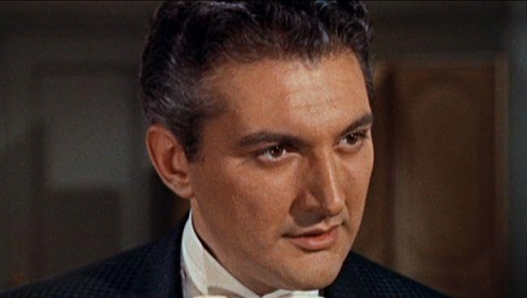There are bad movies, and then there are so-bad-it’s-good movies, and then there’s Sincerely Yours—a film so drenched in Liberace’s rhinestone-coated earnestness that it circles back around to being kind of fantastic. It’s like watching a man who’s too famous to fail, fail spectacularly, all while tickling the ivories with a smile so wide it could be used to land planes. And yet, despite the critics sharpening their knives in 1955 and Warner Bros. running for the hills, Sincerely Yours has that weird, hypnotic quality that makes you watch it, shake your head, and then—admit it—watch it again.
A Piano, A Contract, and a Cinematic Misfire
By the mid-1950s, Liberace was a national obsession. This was the guy who made classical music cool (or at least glittery), had a Vegas act that could outshine the Strip, and was pulling TV ratings that would make modern-day influencers weep. Warner Bros., seeing a chance to cash in, handed him a two-picture deal and built a movie around the one thing he could do better than anyone: play the piano like his life depended on it.
The script? Who cares. The logic? Also irrelevant. Sincerely Yours is a remake of The Man Who Played God (1932), itself a remake of The Silent Voice (1922), which was based on a 1914 play. This thing had more iterations than an iPhone. But for the first time, instead of a legendary actor like George Arliss in the lead, they handed the reins to a man whose entire on-screen charisma was built around winking at the camera and making your grandmother swoon.
From Doris Day to Lip-Reading Lessons: The Casting & Production
Doris Day was reportedly considered for the female lead but dodged that bullet like Neo in The Matrix. Instead, we got Joanne Dru, a solid actress whose job was essentially to gaze longingly at Liberace while pretending this wasn’t a career detour into cinematic absurdity. Dorothy Malone, who would go on to win an Oscar two years later, gamely played the woman who falls for Liberace but realizes she’s actually in love with someone else. (Hollywood may have had its faults, but at least it had a sense of reality.)
Production-wise, Warner Bros. tried. They really did. They gave Liberace a New York penthouse, an existential crisis about sudden deafness, and a little kid to remind him of the power of hope. They even threw in a love triangle. But what they didn’t give him was the candelabra. That’s right—the most candelabra-infused performer of the 20th century, and not a single one made it onto the screen. It’s like making a Tarantino movie without feet.
Releasing a Flop and Rewriting History
Warner Bros. released Sincerely Yours with a marketing campaign that screamed “FABULOUSLY YOURS” in giant, blocky letters, but the public took one look and collectively said, “No, thanks.” The film’s New York premiere barely made back the popcorn sales, and within two weeks, it was yanked from theaters like an embarrassing karaoke performance. Warner was so spooked that they paid Liberace to not make a second movie—meaning he got Hollywood’s first-ever “please go away” settlement.
Critics weren’t just mean—they were gleeful. The Los Angeles Times called it “unintentionally hilarious.” Films and Filming said it was “drenched in coy bathos to the point of embarrassment.” Even Liberace, years later, got in on the joke. At the 1982 Academy Awards, after a clip of the movie played, he simply smiled, played the theme song, and said, “Well, I’ve done my part for motion pictures—I’ve stopped making them.”
Legacy: From Trainwreck to Treasure
And yet, despite the trainwreck, Sincerely Yours has endured. It’s been lovingly cataloged in The Official Razzie Movie Guide as one of the 100 Most Enjoyably Bad Films ever made. It’s the kind of movie that, had it been released in the age of social media, would have been a meme-factory of awkward pauses, bedazzled suits, and over-the-top melodrama.
But here’s the thing: It’s not that bad. It’s just weird. And weird has a way of sticking around. Liberace might not have had the acting chops, but he had the sheer, blinding force of personality that makes you want to keep watching, even when everything around him is collapsing.
Final Verdict
Four stars—not because it’s a great movie, but because it’s an experience. If you’ve ever wanted to see a world-famous pianist attempt to act, battle deafness, lose the girl, get a redemption arc, and somehow make it all seem like an extended Vegas lounge act, this is the film for you. Watch it with friends, a bottle of wine, and an appreciation for the bizarre. And for God’s sake, bring your own candelabra.
⭐️⭐️⭐️⭐️ (4/5)
#SincerelyYours1955 #Liberace #ClassicMovies #OldHollywood #1950sCinema #GoldenAgeOfHollywood #FilmReview #MovieReview #VintageFilms #FilmCritic #Cinema #ForgottenHollywood





No comments:
Post a Comment